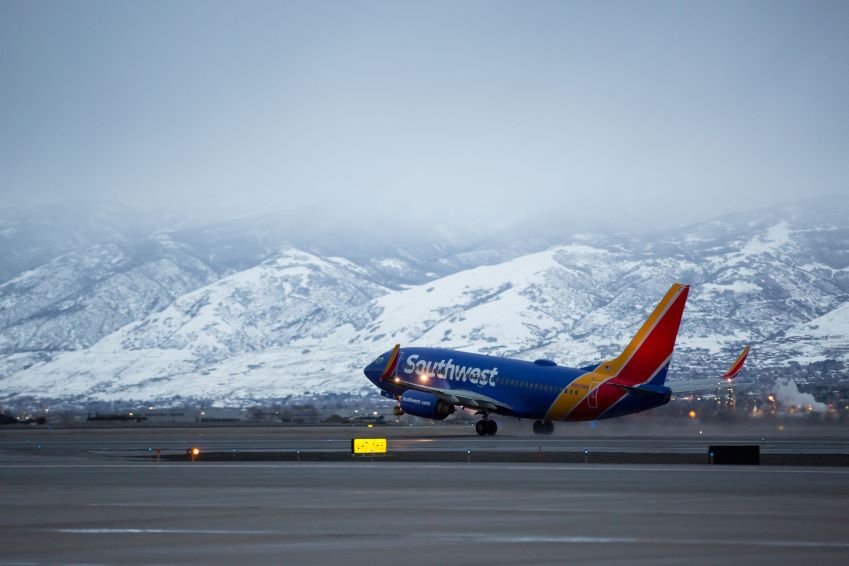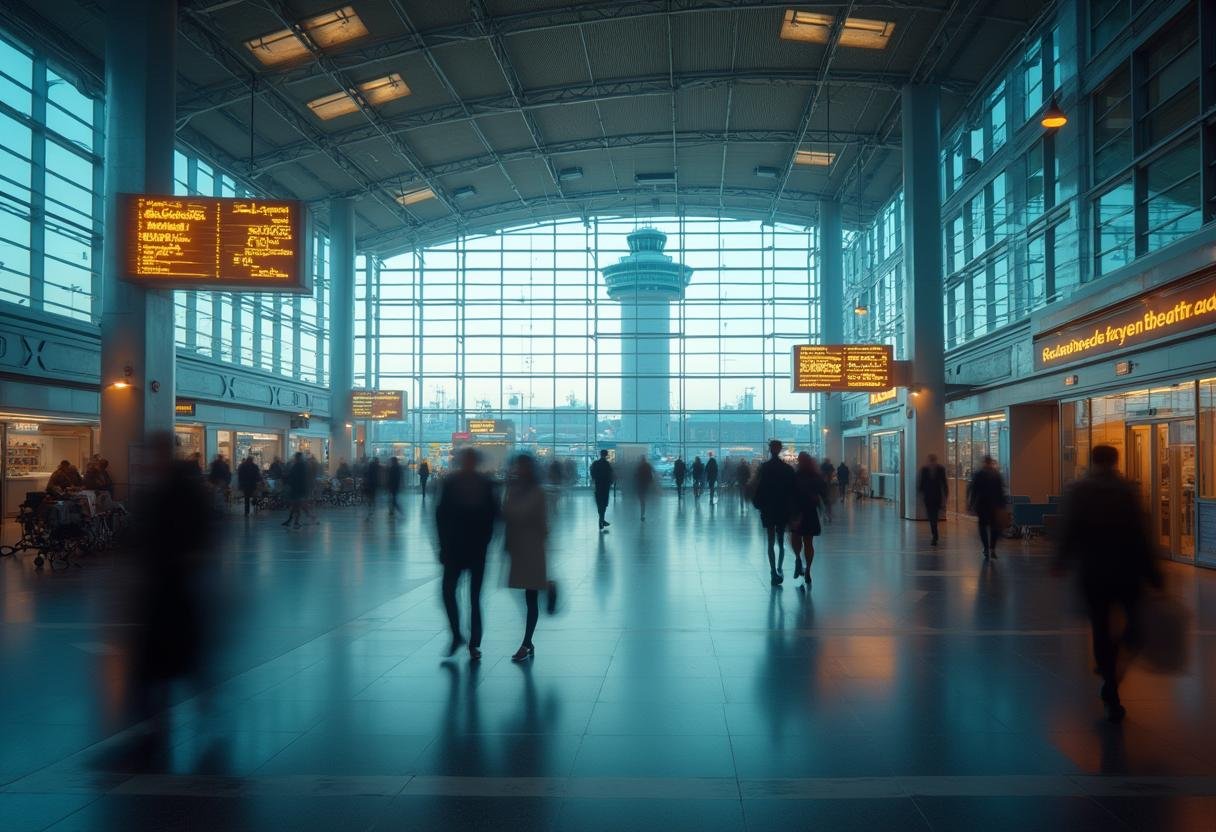Flight Buzz
Summer Travel Chaos New Updates: Southwest Airlines Shuts Down 758 Flights Across Dallas, Denver, Chicago, Phoenix, Las Vegas, Orlando, and Los Angeles

Tuesday, August 5, 2025
Southwest Airlines has encountered a severe disruption, resulting in the cancellation of 758 flights across its extensive network, including major destinations such as Dallas Love Field (DAL), Denver International Airport (DEN), Chicago Midway (MDW), Phoenix Sky Harbor (PHX), Las Vegas McCarran (LAS), Orlando International Airport (MCO), and Los Angeles International Airport (LAX).
This operational chaos has affected thousands of travelers, causing widespread delays, canceled trips, and substantial inconvenience, particularly during the busy summer travel season.
The Scope of the Disruptions
The cancellation of 758 flights represents a significant portion of Southwest Airlines’ daily operations, with major hubs like Dallas, Denver, Chicago, and Phoenix hit hardest by the service interruptions. The airline’s extensive network of routes connecting U.S. cities to both domestic and international destinations has been severely impacted.
Flights from high-traffic airports such as Dallas Love Field, a key hub for Southwest Airlines, and other busy airports like Denver and Chicago, have faced delays and cancellations. As a result, thousands of passengers have been stranded at gateways across the country, scrambling for alternatives or being forced to seek overnight accommodations.
Southwest Airlines typically operates numerous flights between Dallas, Denver, Chicago, Phoenix, Las Vegas, Orlando, and Los Angeles daily, serving both business and leisure travelers. The scale of the disruption has compounded challenges for affected passengers who were relying on the airline for time-sensitive trips. Additionally, international flights from Phoenix to various international locations have also been affected by these cancellations.
Possible Causes of the Chaos
The exact causes behind the widespread cancellations have not been fully detailed by Southwest Airlines, though experts suggest that a combination of operational and external factors may be responsible. Weather conditions, particularly thunderstorms in the Midwest and West Coast, could have contributed to delays, especially in the heavily trafficked airspace above major airports like Chicago Midway and Phoenix Sky Harbor.
Another factor is the strain on air traffic control systems, which have been under pressure due to higher-than-usual air travel demand and airspace congestion. These delays, compounded by Southwest’s reliance on a point-to-point flight model, which can create scheduling issues when one flight is delayed, could have cascaded and led to such widespread disruptions.
In addition to weather and air traffic control delays, it is possible that staffing issues, which have affected airlines globally, may have played a role. With increased travel volumes during peak travel seasons, Southwest may have struggled to maintain its staffing levels, further contributing to delays.
Impact on Passengers
The cancellation of 758 flights has wreaked havoc for passengers, particularly those traveling between high-traffic U.S. destinations. Dallas, Denver, and Chicago are among the busiest airports in Southwest’s network, with many travelers using these airports for both short-haul and long-haul flights. The extensive delays and cancellations have disrupted passengers’ travel plans, leaving them stranded and searching for alternate routes.
For business travelers, the impact has been especially severe, as many have missed important meetings or business engagements due to the delays. Leisure travelers heading to popular vacation spots like Las Vegas, Orlando, and Los Angeles have also been severely impacted by canceled flights, leading to missed vacations and frustrations.
Many passengers have reported long lines at customer service counters, difficulty reaching representatives via phone, and limited availability of alternate flights. Southwest has worked to accommodate passengers with rebooking options, but the large number of affected individuals has overwhelmed the airline’s capacity to provide swift service.
Southwest Airlines’ Efforts to Resolve the Situation
In response to the widespread disruption, Southwest Airlines has deployed extra staff at major airports like Dallas Love Field, Chicago Midway, and Phoenix Sky Harbor to assist affected travelers. Customer service representatives have been available at gateways to offer information and help passengers with rebooking their flights.
Passengers whose flights have been canceled are being given priority for rebooking, though availability remains limited due to the scale of the situation. For many travelers, the next available flight is several hours or even days away, depending on their original destination. Southwest has also been offering accommodation for stranded passengers in cases where overnight stays are necessary.
The airline is also issuing refunds and travel vouchers for those who choose not to rebook. These efforts are part of Southwest’s ongoing efforts to mitigate the inconvenience caused by the disruptions.
What Affected Passengers Can Do
For travelers affected by the 758 flight cancellations, there are several steps they can take:
- Check for Flight Updates: Passengers should regularly check the Southwest Airlines website or app for real-time updates on the status of their flights and any potential rebooking options.
- Contact Customer Service: Travelers can reach out to Southwest’s customer service via phone, social media, or at the airport’s service counters for assistance with rebooking or to arrange refunds.
- Consider Alternate Airports: Travelers who are flexible with their travel plans may want to consider flights from nearby airports or consider other carriers.
- Prepare for Delays: Those whose flights remain scheduled may experience delays, so it is advisable to check flight statuses ahead of time and plan for potential disruptions.
Southwest Airlines’ Long-Term Strategy
This massive disruption underscores the challenges Southwest Airlines faces as it continues to recover from the pandemic and adjust to the rapidly growing demand for air travel. Although the airline has managed to handle many high-demand routes efficiently in the past, incidents like this highlight the potential vulnerabilities of relying on a point-to-point model.
As Southwest Airlines works through these challenges, it may look to enhance its operational systems and consider increasing staffing to handle peak periods. The airline has historically maintained a high standard for on-time performance, but this disruption demonstrates that even the most reliable airlines can face operational challenges in times of high demand.
Looking Ahead: Impact on Future Travel
The cancellation of 758 flights by Southwest Airlines will likely have a ripple effect on the airline’s future schedules and customer perception. However, the airline has shown a commitment to resolving the disruptions and returning to normal operations as quickly as possible. As Southwest continues to navigate the complexities of increased air travel demand, both customers and the airline will need to adjust to the evolving landscape of post-pandemic travel.
Conclusion
The 758 flight cancellations by Southwest Airlines have caused significant disruption for thousands of passengers traveling between key U.S. destinations like Dallas, Denver, Chicago, Phoenix, Las Vegas, Orlando, and Los Angeles. While the airline has responded by providing rebooking options, accommodations, and refunds, the scale of the situation has left many passengers stranded or facing substantial delays. As the airline works to restore normal operations, passengers are encouraged to stay informed about their flight statuses and consider alternative travel options where possible.
Image: Southwest Airlines
Flight Buzz
Cathay Pacific’s flights take you around the world in unparalleled comfort

Cathay Pacific’s direct flights take you to some of the most attractive cities in the world, whether you love walking on the historic roads of Rome, joining the revelry of London, immersing yourself in the lights of Paris or basking in the charming vistas of Madrid. One can fly further still to the west coast of North America to view the sights of San Francisco, the vibrancy of Los Angeles and revel in the city that never sleeps—New York.
In case you missed it: A class of its own: Cathay Pacific’s new Aria Suite sets the bar high for Business Class
Though your time in the sky may be long, you’ll find no shortage of activities to enjoy. Skytrax ranked Cathay Pacific as the third best airline in the world in 2025, with its in-flight entertainment considered the world’s best. Such accolades are well-earned: there are over 4,000 hours of movies, TV series, K-dramas and other exclusive titles, alongside Wi-fi that helps you stay in touch with your loved ones, wherever they may be. Its dining options are also enhanced thanks to partnerships with acclaimed restaurants such as Michelin-starred Yat Tung Heen, renowned for its traditional Cantonese cuisine.
Flight Buzz
Sydney Faces Major Travel Disruptions as Heavy Fog Cancels Ferries and Delays Flights: Full Travel Update

Tuesday, August 5, 2025
Commuters in Sydney have faced significant disruptions this morning due to heavy fog, which led to the cancellation of ferry services and delays to several flights at Sydney Airport. Travelers have been advised to check the status of their flights and alternative transport options.
Impact on Transportation: Ferries and Flights Affected
Sydney’s famous Harbour was engulfed in a thick blanket of fog early this morning, leaving only the tops of skyscrapers and the Sydney Harbour Bridge barely visible. Ferry services were halted initially due to the poor visibility, causing significant disruptions for passengers looking to cross the harbour. Although some services have resumed, routes such as the F3 Parramatta River and F4 Pyrmont Bay remain affected.
Ferry services operating east of the Sydney Harbour Bridge have been progressively restored, however, significant cancellations remain on the routes linking Circular Quay to Rydalmere, and between Sydney Olympic Park and Barangaroo. Given these persistent disruptions, passengers are recommended to consider alternative transport options, notably the bus network, to complete their journeys.
At Sydney Airport, dense fog has led to the deferral of a number of flights; nonetheless, officials confirm that the issue has not resulted in a systemic breakdown of the schedule. Airlines are actively working to reduce the knock-on effects of the weather. Travellers scheduled to depart Sydney are encouraged to verify the latest information by contacting their carriers directly to ascertain any updates regarding timing.
Weather Warnings: Hazardous Conditions Ahead
While Sydney is expected to see the fog lift later this morning, the weather conditions have left the city’s transport infrastructure grappling with delays. The fog has stretched across Sydney’s north and western areas, reducing visibility to hazardous levels.
The Bureau of Meteorology (BoM) has warned that although the fog will clear, travelers should remain cautious as the weather evolves. Along with the fog, strong winds and powerful surf conditions are expected later today. The BoM has issued warnings for large waves, making rock fishing, surfing, and swimming potentially dangerous. Residents and visitors are advised to avoid these activities due to the high risk.
Despite the adverse weather conditions, Sydney is expected to see a maximum temperature of 21°C later today, offering a more pleasant climate as the fog lifts.
Travel Tips for Commuters and Visitors
Transport authorities are actively monitoring the ferry network and encourage all users to consult service bulletins at regular intervals. Passengers facing cancellations are advised to consider supplementary bus services that have been organized. Anyone intending to travel to the airport should allow extra time in anticipation of possible delays. Most airlines are offering live status feeds via their websites and applications. Sydney residents and visitors are advised to keep abreast of evolving weather across the day. The expectation is that visibility will improve once the fog lifts; however, strengthening winds and rising surf are likely to impede travel later.
Impacts on Tourism and Commuting Patterns
Sydney, a major international travel hub, is often a bustling scene of tourists and locals commuting across the city. However, today’s disruptions are a reminder of the challenges that unexpected weather conditions can pose on transportation systems. Visitors to Sydney, especially those planning to explore iconic sites like the Sydney Opera House, the Royal Botanic Garden, and Bondi Beach, may experience delays or need to adjust their travel itineraries due to the fog-related disruptions.
Travelers should be aware of possible changes to scheduled tours and activities, especially those requiring transport across the city. Local businesses catering to tourists are also likely to experience disruptions due to the delays in public transport, which could affect their opening hours and service levels.
Looking Ahead: Clearing Skies and Improving Conditions
As the day progresses, Sydney is expected to see a return to clearer skies. The fog is forecast to dissipate by mid-morning, providing an opportunity for smoother travel as the day unfolds. With the easing of weather conditions, ferry services will likely return to full operation. For air travelers, any lingering delays should diminish, but passengers should continue to monitor their flight statuses closely.
The ongoing updates from the Bureau of Meteorology and transport authorities will provide the latest information, allowing commuters to better plan their day and avoid unnecessary delays.
Key Points to Remember:
Ferry Cancellations and Delays: Ferries east of the Sydney Harbour Bridge are operational, but routes like F3 Parramatta River and F4 Pyrmont Bay remain affected.
- Flight Delays: Passengers should check with airlines for flight updates as fog continues to disrupt air travel.
- Hazardous Surf Conditions: Strong winds and large waves are expected later today, making water-based activities dangerous.
- Weather Improvements: The fog is expected to clear by mid-morning, with a pleasant temperature of 21°C later today.
Flight Buzz
Netherlands Faces Major Travel Chaos at Amsterdam Schiphol Airport With Multiple Cancellations, Disrupting Flights for KLM, Emirates, British, American, Iberia, and More

Tuesday, August 5, 2025
Netherlands’ Schiphol Airport, one of Europe’s busiest travel hubs, experienced major disruptions yesterday. There were 406 flight delays and 28 cancellations, impacting travelers around the world. Passengers flying with airlines like KLM, Emirates, British Airways, American Airlines, and Iberia faced significant delays on both domestic and international flights. The chaos was caused by a mix of weather issues, logistical problems, and the usual operational challenges that airports encounter during busy travel periods.
The disruptions at Amsterdam Schiphol Airport caused significant delays and cancellations, affecting numerous airlines and routes. A total of 406 flight delays were recorded, with 28 cancellations impacting travel to and from various international destinations, including France, the UAE, the UK, the USA, and Spain. Notably, airlines such as KLM, Emirates, British Airways, American Airlines, and Iberia were among the hardest hit, with many flights delayed by several hours. The delays accounted for roughly 6% of all scheduled flights, while cancellations made up around 1% of the airport’s total operations. Both domestic and international flights were affected, making the disruptions widespread and impacting passengers traveling to major cities across Europe, the Middle East, and North America. These disruptions were compounded by logistical challenges, poor weather conditions, and staffing shortages, making travel planning difficult for many passengers.
Key Statistics and Breakdown of Delays and Cancellations
- Total delays at Amsterdam Schiphol: 406
- Delays within, into, or out of the United States: 13
- Total cancellations at Amsterdam Schiphol: 28
These disruptions resulted in longer wait times for passengers and put extra pressure on the airport’s operations. Travelers experienced extended delays due to various factors, including weather conditions and staffing shortages, which contributed to the widespread delays and cancellations.
Delayed Flights by Airline
Delays were widespread across multiple airlines, but KLM, a major carrier at Amsterdam Schiphol, saw the most notable delays. The airline accounted for 181 of the delayed flights, which is about 26% of the total. Other airlines, like easyJet, HOP!, and Air France, were also significantly affected, experiencing noticeable delays in their departures.
KLM: 181 delayed flights (26% of total delays)
easyJet: 31 delayed flights (27% of total delays)
HOP!: 5 delayed flights (20% of total delays)
Air France: 5 delayed flights (20% of total delays)
Cancellations by the Airline
Cancellations played a major role in the disruptions. The following airlines recorded the highest number of cancellations:
KLM: 21 cancellations (3% of total cancellations)
easyJet: 4 cancellations (3% of total cancellations)
Garuda Indonesia: 1 cancellation (100% of its scheduled flights)
Air Arabia Maroc: 5 cancellations (100% of its scheduled flights)
KLM also led in cancellations, which caused further disruptions for international flights from Schiphol. Garuda Indonesia and Air Arabia Maroc were particularly impacted, with all of their flights for the day canceled.
Impact on International Travel Routes
Amsterdam Schiphol is a central hub for both European and international travel. Delays and cancellations affected not just European flights but also international travel. Notably, destinations in the United States experienced 13 delays, highlighting how Schiphol’s issues impacted global air traffic.
U.S.-bound delays: 13 delays affecting travelers to and from Amsterdam Schiphol
Key international cancellations: Flights to and from Jakarta-Soekarno-Hatta, Hong Kong International, and Jomo Kenyatta International in Nairobi were among the most affected.
The disruptions were not limited to European destinations. Travelers from various regions also faced delays in their connecting flights.
Analysis of Cancellations by Airport
Cancellations extended beyond airlines at Amsterdam Schiphol. Other international airports also reported significant cancellations due to the disruptions there. Here’s a snapshot of some of those airports:
London Gatwick (LGW): 33% of flights were canceled, significantly impacting outbound travelers from Schiphol.
Zurich (ZRH): 60% of flights were delayed or canceled, affecting travelers transiting through Schiphol.
Frankfurt International Airport (FRA): About 54% of connecting flights were affected by cancellations from Schiphol, worsening the issue.
The Root Causes of the Disruptions
Several factors led to the disruptions at Amsterdam Schiphol. Although detailed investigations are ongoing, the airport has confirmed that issues such as staffing shortages and severe weather contributed to the delays and cancellations. During busy travel periods, logistical problems worsened the situation, creating further challenges for connecting flights globally.
Navigating Through the Disruption: Tips for Travelers
For passengers traveling through Schiphol during these disruptions, staying informed and proactive is crucial. Here are some tips:
Stay updated: Regularly check flight status through official airline apps or Schiphol’s website for real-time updates on delays and cancellations.
Allow extra time: With delays and cancellations, airports can become busier. It’s essential to allocate extra time for security and rebooking processes.
Rebook immediately: If your flight is canceled, rebook your ticket as soon as possible through your airline’s customer service or online platform.
Schiphol Airport is committed to improving communication with passengers and reducing the impact of future disruptions.
Conclusion: A Glimpse into the Future of Schiphol Airport Operations
Although the delays and cancellations yesterday were significant, Schiphol Airport is focused on addressing the underlying issues. Improvements in infrastructure, staffing, and operational efficiency aim to lessen the frequency and severity of such disruptions in the future. Travelers should stay vigilant and patient as Schiphol continues to navigate peak travel challenges.
While the airport and airlines are taking steps to prevent future disruptions, it remains important for passengers to stay informed and be ready for potential delays. Monitoring official announcements and planning for extra travel time will help ensure a smoother experience, even in the face of challenges.
-

 Brand Stories2 weeks ago
Brand Stories2 weeks agoBloom Hotels: A Modern Vision of Hospitality Redefining Travel
-

 Brand Stories1 week ago
Brand Stories1 week agoCheQin.ai sets a new standard for hotel booking with its AI capabilities: empowering travellers to bargain, choose the best, and book with clarity.
-

 Destinations & Things To Do2 weeks ago
Destinations & Things To Do2 weeks agoUntouched Destinations: Stunning Hidden Gems You Must Visit
-

 Destinations & Things To Do1 week ago
Destinations & Things To Do1 week agoThis Hidden Beach in India Glows at Night-But Only in One Secret Season
-

 AI in Travel2 weeks ago
AI in Travel2 weeks agoAI Travel Revolution: Must-Have Guide to the Best Experience
-

 Brand Stories1 month ago
Brand Stories1 month agoVoice AI Startup ElevenLabs Plans to Add Hubs Around the World
-

 Brand Stories3 weeks ago
Brand Stories3 weeks agoHow Elon Musk’s rogue Grok chatbot became a cautionary AI tale
-

 Asia Travel Pulse1 month ago
Asia Travel Pulse1 month agoLooking For Adventure In Asia? Here Are 7 Epic Destinations You Need To Experience At Least Once – Zee News
-

 AI in Travel1 month ago
AI in Travel1 month ago‘Will AI take my job?’ A trip to a Beijing fortune-telling bar to see what lies ahead | China
-

 Brand Stories2 weeks ago
Brand Stories2 weeks agoContactless Hospitality: Why Remote Management Technology Is Key to Seamless Guest Experiences













You must be logged in to post a comment Login